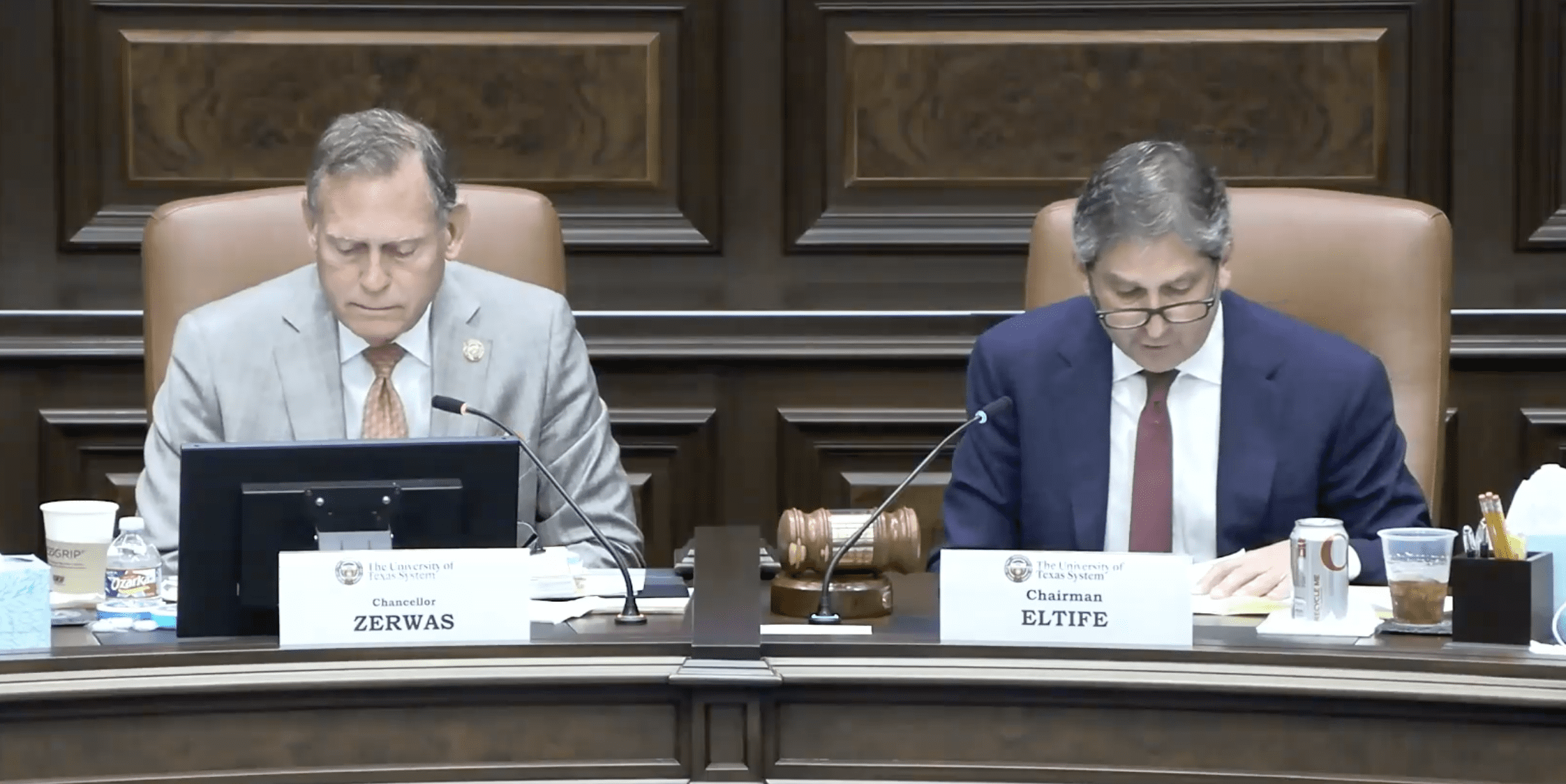Two of the individuals on the search committee for the next Texas A&M president have histories of advocating for DEI. The former speaker of the faculty senate, who defended “shared governance,” is also on the committee, despite regents having reconstituted that body in an advisory-only capacity.
On Tuesday, Chancellor Glenn Hegar announced the 16 members of the search committee for the next president of the College Station campus.
The announcement listed Nate Sharp, dean of the Mays Business School, Trev Alberts, director of athletics, and former speaker of the Texas A&M faculty senate Andrew Klein as members.
As previously reported, Sharp wrote of his “unwavering commitment” to DEI in his application to Texas A&M. He also expressed his intention, if hired, to embrace environmental social governance (ESG).
Katherine Banks, then-president of Texas A&M-College Station, picked Sharp as the Mays dean starting in February 2023, despite a survey report that showed neither professors nor staff preferred him. Banks resigned later that year following controversy over the attempted hiring of a radical, pro-DEI professor to lead A&M’s journalism school.
Previously, Sharp headed the James Benjamin Department of Accounting at Mays. In 2022, he established the Black Accounting Student Success (BASS) Initiative, which gave scholarships solely to black students in an effort to change the department’s demographics. Just one year later, Gov. Greg Abbott signed a state law—Senate Bill 17—that banned DEI offices and initiatives at universities.
In 2025, Sharp initially sponsored a DEI conference that excluded white and Asian students. Abbott threatened to fire Texas A&M President Mark Welsh because of this, which prompted the university to withdraw.
As for Alberts, Welsh announced in March 2024 that he would be Texas A&M’s new athletics director.
Alberts left his athletic director position at the University of Nebraska for TAMU months after voters elected Republican Governor Jim Pillen. Pillen had served on the University of Nebraska Board of Regents since 2012, during which time he unsuccessfully pushed his fellow regents to act against critical race theory. Pillen resigned from the board in January 2023 after winning the governorship.
The University of Nebraska’s website recorded that Alberts served on its Athletics Inclusion Council in 2019, which met “to develop and evaluate the strategic plan for diversity and inclusion in Nebraska Athletics.” He’s prominently displayed in photos of the university’s 2023 DEI summit.
Alongside DEI initiatives, state lawmakers have also reformed universities themselves. But Andrew Klein, a geography professor and former two-term speaker of the TAMU faculty senate (2019-2020; 2024-2025), defended “shared governance,” the previous mode of operation, during the faculty senate’s August 11 meeting.
“I think that we all have to work really hard to ensure that it continues, because it has serious ramifications to our standing as universities in the world,” he said.
“Shared governance” is a system in which universities’ boards of regents delegate authority to university presidents, who subsequently share power with the faculty, which is represented by a faculty senate.
Regents are accountable to Texans through the governor, who appoints them, and the State Senate, which confirms them. Faculty senates enjoyed no such accountability until state lawmakers overhauled university governance through Senate Bill 37. The new law dissolved existing faculty senates or councils on September 1 but gave regents the option to reconstitute them as advisory-only bodies.
On August 29, Texas A&M’s regents reconstituted their faculty senates according to the new law’s requirements. TAMU now has a faculty advisory council, which confirmed to Texas Scorecard it currently has no speaker.
After the regents ended an LGBTQ minor and 51 other “low-performing” progams in November 2024, Klein said “I think there’s a lot of concern about [the regents’ action].”
As members of the search committee, Sharp, Alberts, and Klein will participate in guiding the search for the next president of the College Station campus.
Other members of the committee include Corps of Cadets Commandant Lt. Gen. James W. “Chip” Bierman Jr., USMC (Ret.), Petroleum Engineering Department Head Thomas Blasingame, College of Medicine Dean Amy Waer, and Executive Vice Chancellor Susan Ballabina. Texas A&M University System (TAMUS) Board of Regents Chair Robert Albritton as well as regents John Bellinger and Mike Hernandez are also members.
“This is a committee of accomplished leaders who know exactly what makes Texas A&M University special,” Hegar stated on October 7. “They understand our rich traditions, our mission, and our grit. I’m confident they’ll bring us a leader who will lead Texas A&M with the same passion and purpose that built it.”
TAMUS created this committee after Welsh, who promoted left-wing agendas, resigned after controversy erupted over course content in a TAMU children’s literature class that included guidance on how to introduce LGBT material to children.
The regents named James Hallmark, the A&M system’s vice chancellor for academic affairs, as acting president. Hallmark had previously defended diversity, equity, and inclusion policies as a key factor in “student success.” On October 3, the regents named former state lawmaker Tommy Williams as interim president.
Since 2023, in response to public outcry, state lawmakers have worked to reform Texas higher education, starting with the DEI ban. They acted again in 2025 by abolishing “shared governance” via SB 37.
TAMUS did not respond to a request for comment before publication.
If you are a student, parent, faculty or staff member, or concerned taxpayer who would like to partner with us to promote transparency in taxpayer-subsidized higher education, please email us at scorecardtips@protonmail.com.
No ads. No paywalls. No government grants. No corporate masters.
Just real news for real Texans.
Support Texas Scorecard to keep it that way!





